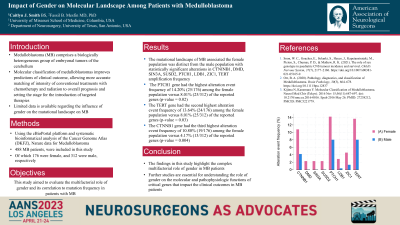Impact of Gender on Molecular Landscape Among Patients with Medulloblastoma
Friday, April 21, 2023

Has Audio

Caitlyn Smith, BS
Medical Student
University of Missouri School of Medicine
Columbia, Missouri, United States
ePoster Presenter(s)
Introduction: Medulloblastoma (MB) comprises a biologically heterogeneous group of embryonal tumors of the cerebellum. Molecular classification of medulloblastomas improves clinical outcome predictions, allowing more accurate matching of the intensity of conventional treatments with chemotherapy and radiation to overall prognosis and setting the stage for introducing targeted therapies. Limited data is available regarding the influence of gender on the mutational landscape of MB. This study aimed to evaluate the multifactorial role of gender and its correlation to mutation frequency in patients with MB.
Methods: Using the cBioPortal platform and systematic bioinformatical analysis of the Cancer Genome Atlas (DKFZ), Nature data for Medulloblastoma, 488 MB patients, were included in this study. Of which 176 were female, and 312 were male, respectively.
Results: The mutational landscape of MB associated with the female population was distinct from the male population, with statistically significant alterations in CTNINB1, DMD, SIN3A, SUSD2, PTCH1, LDB1, ZIC1, and TERT amplification frequency. The PTCH1 gene had the highest alteration event frequency of 14.20% (25/176) among the female population versus 8.01% (25/312) of the reported genes (p-value = 0.02). The TERT gene had the second highest alteration event frequency of 13.64% (24/176) among the female population versus 8.01% (25/312) of the reported genes (p-value = 0.03). The CTNNB1 gene had the third highest alteration event frequency of 10.80% (19/176) among the female population versus 4.17% (13/312) of the reported genes (p-value = 0.004).
Conclusion : The findings in this study highlight the complex multifactorial role of gender in MB patients. Further studies are essential for understanding the role of gender on the molecular and pathophysiologic functions of critical genes that impact the clinical outcomes in MB patients.
Methods: Using the cBioPortal platform and systematic bioinformatical analysis of the Cancer Genome Atlas (DKFZ), Nature data for Medulloblastoma, 488 MB patients, were included in this study. Of which 176 were female, and 312 were male, respectively.
Results: The mutational landscape of MB associated with the female population was distinct from the male population, with statistically significant alterations in CTNINB1, DMD, SIN3A, SUSD2, PTCH1, LDB1, ZIC1, and TERT amplification frequency. The PTCH1 gene had the highest alteration event frequency of 14.20% (25/176) among the female population versus 8.01% (25/312) of the reported genes (p-value = 0.02). The TERT gene had the second highest alteration event frequency of 13.64% (24/176) among the female population versus 8.01% (25/312) of the reported genes (p-value = 0.03). The CTNNB1 gene had the third highest alteration event frequency of 10.80% (19/176) among the female population versus 4.17% (13/312) of the reported genes (p-value = 0.004).
Conclusion : The findings in this study highlight the complex multifactorial role of gender in MB patients. Further studies are essential for understanding the role of gender on the molecular and pathophysiologic functions of critical genes that impact the clinical outcomes in MB patients.
